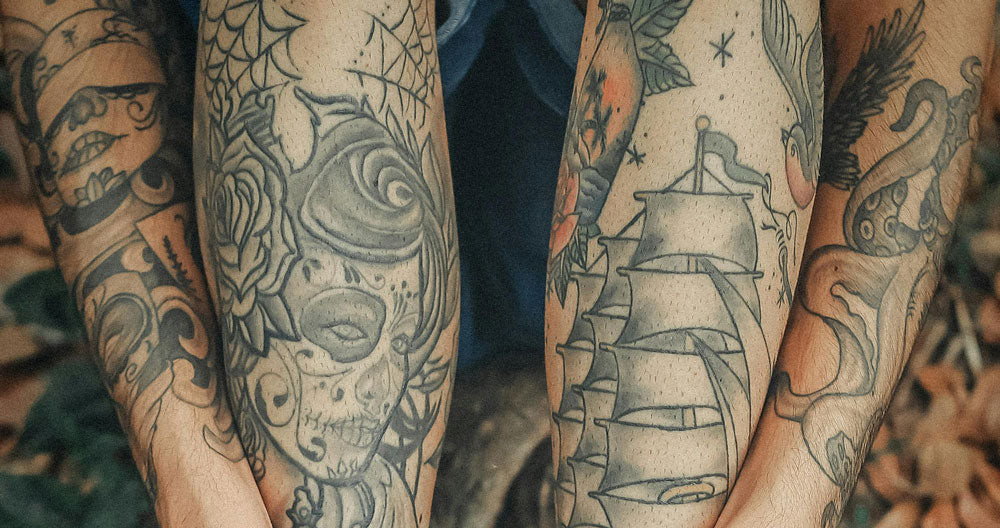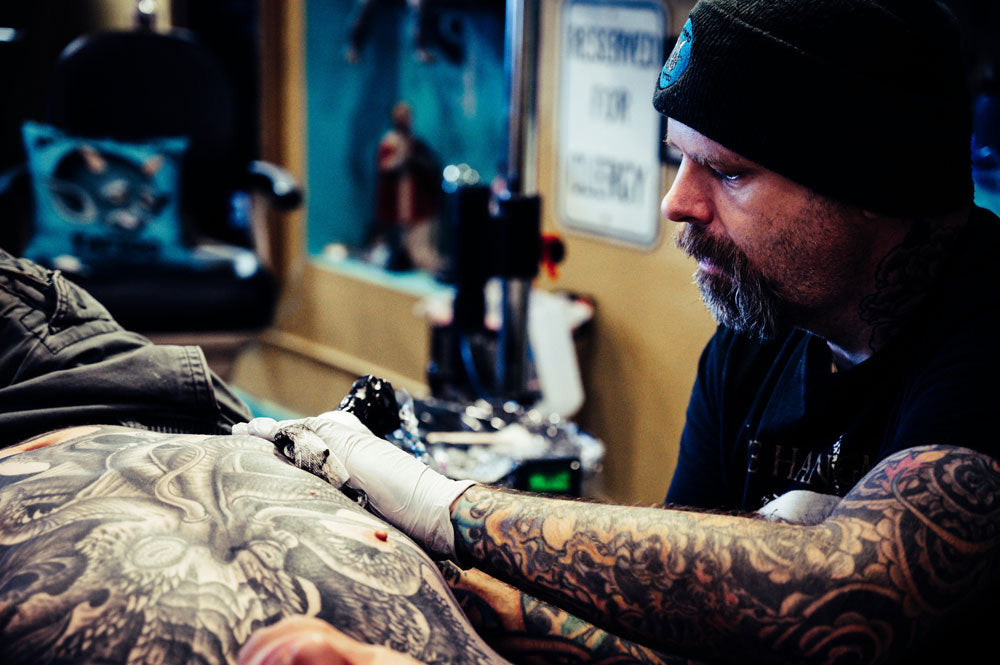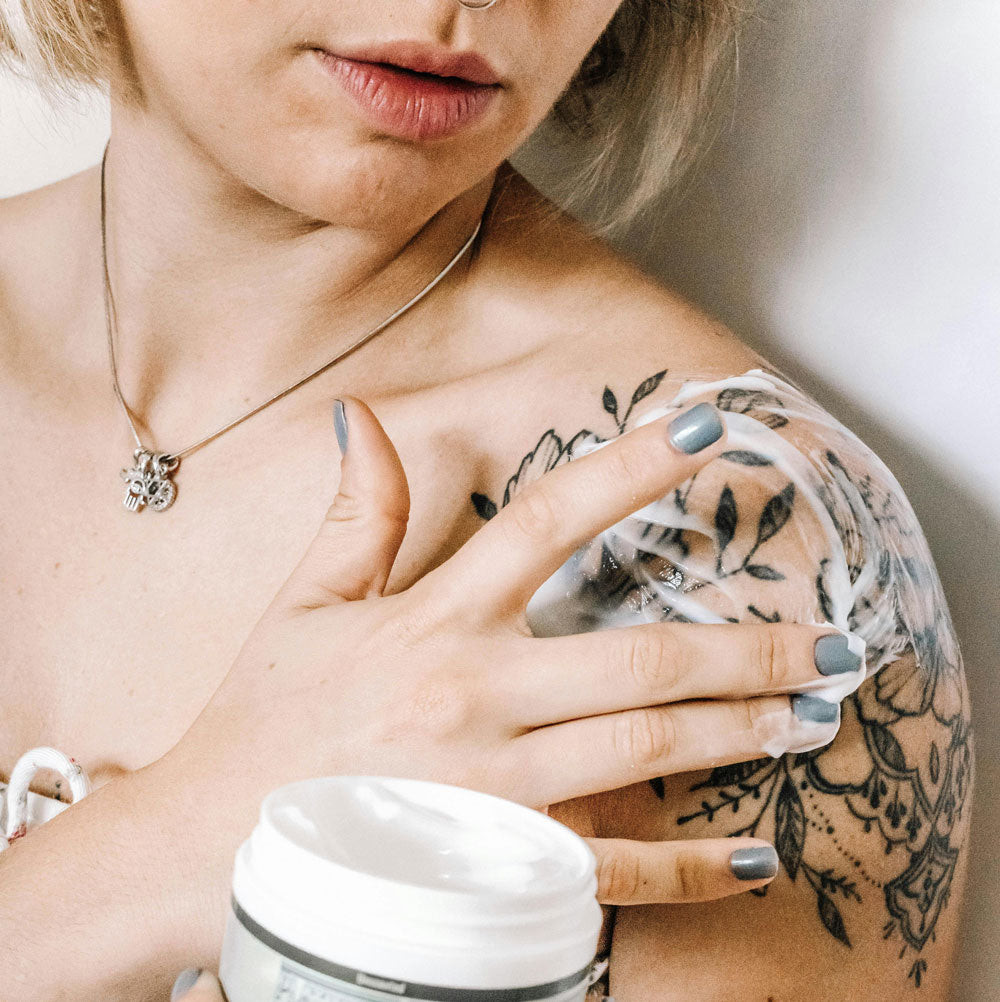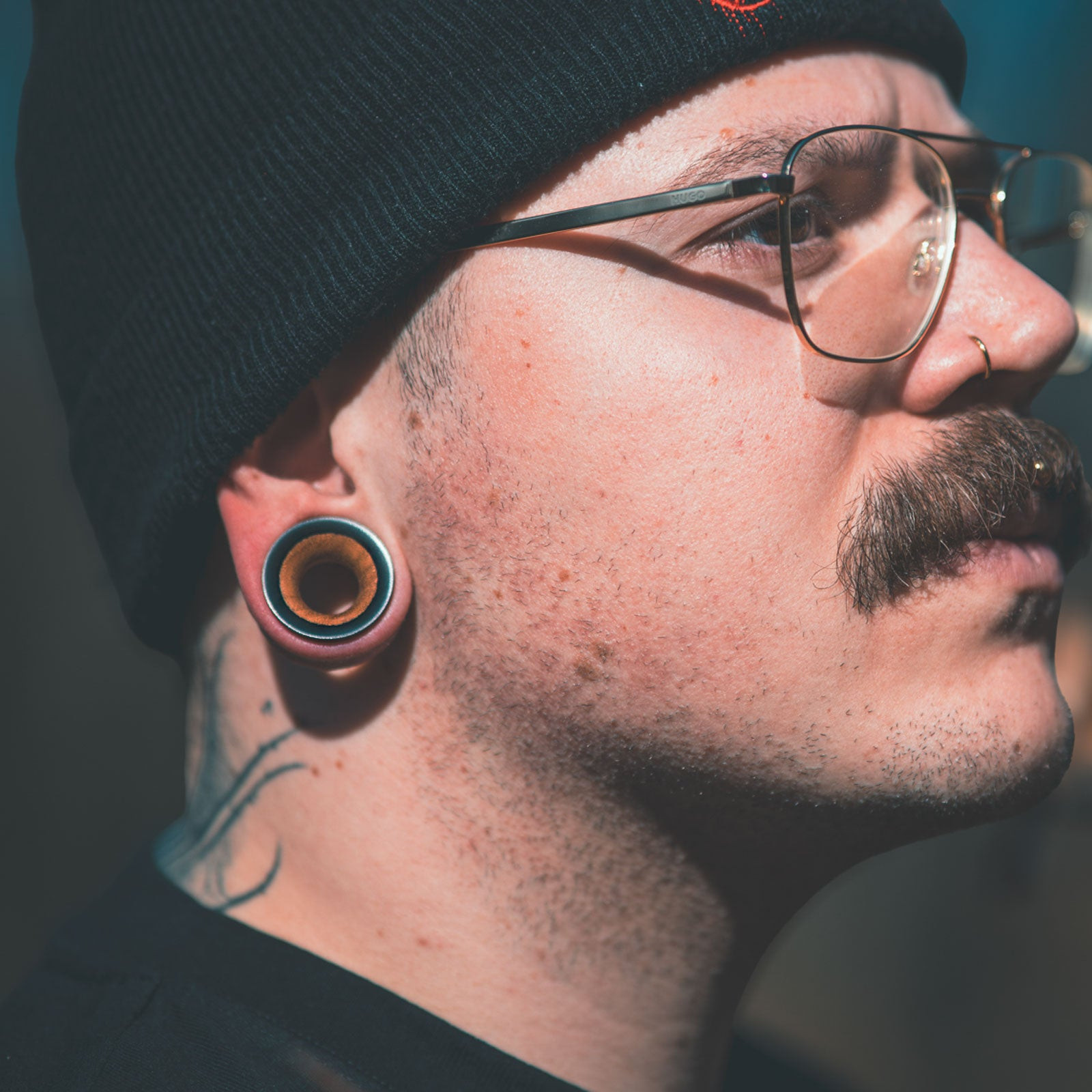Tattoo flu is not a pleasant experience, but understanding it can help you manage it effectively. Tattoo flu refers to a set of symptoms that mimic the common flu, often appearing after getting a new tattoo, but don’t worry tattooat.com is here to guide you through the causes, symptoms, and proven remedies to help you feel better and ensure your tattoo heals beautifully and the perfect aftercare products and expert advice. With the right knowledge and aftercare, you can minimize discomfort and enjoy your new body art, plus gain insights into tattoo aftercare and the importance of choosing reputable tattoo artists.
1. Decoding Tattoo Flu
Tattoo flu isn’t a recognized medical condition, it’s more like your body’s reaction to the tattooing process. Think of it as your immune system kicking into high gear. The symptoms are temporary, and manageable.
1.1. What Exactly Is Tattoo Flu?
Tattoo flu refers to flu-like symptoms that sometimes occur after getting a new tattoo. It’s not a virus but rather your body’s natural response to the trauma of the tattooing process, which involves multiple needle punctures to deposit ink into the skin. Tattooing creates a wound that your immune system responds to, triggering inflammation and a range of symptoms.
1.2. Tattoo Flu vs. Tattoo Infection
It’s crucial to distinguish between tattoo flu and a tattoo infection. Tattoo flu is a short-term reaction, typically lasting 24-72 hours, characterized by mild symptoms such as fatigue and low-grade fever. A tattoo infection, on the other hand, presents more severe symptoms that persist and worsen over time. Signs of infection include:
- High fever (over 100.4°F or 38°C)
- Pus or excessive oozing from the tattoo site
- Foul odor emanating from the tattoo
- Intense pain that increases instead of subsiding
- Red streaks spreading from the tattoo
- Significant swelling
If you experience any of these symptoms, it’s essential to seek medical attention promptly to prevent complications.
1.3. Why Does Tattooing Trigger Flu-Like Symptoms?
The tattooing process involves repeatedly puncturing the skin with needles to inject ink, which your body perceives as trauma. This triggers your immune system, leading to inflammation and the release of chemicals like cytokines. This immune response can manifest as flu-like symptoms. A study from Portland State University’s Art Department in July 2023, indicated that the body’s immune response to tattooing is similar to its response to a minor injury or infection. The size and location of the tattoo can also influence the severity of the symptoms. Larger tattoos, especially those in sensitive areas, tend to cause a more pronounced reaction.
 Shin Tattoos
Shin Tattoos
2. Spotting the Signs: Tattoo Flu Symptoms
Recognizing the symptoms of tattoo flu can help you differentiate it from a more serious infection. Common symptoms include:
- Mild fever (usually below 100.4°F or 38°C)
- Fatigue or feeling unusually tired
- Body aches and muscle soreness
- Chills or shivering
- Headache
- Nausea or loss of appetite
- Swollen lymph nodes
2.1. Mild Fever
A low-grade fever is a common symptom of tattoo flu, indicating that your immune system is actively responding to the tattooing process. According to Inked Magazine, a slight temperature elevation is normal as your body works to heal the affected area. This fever is typically mild and temporary, subsiding within a couple of days.
2.2. Fatigue
The tattooing process can be physically taxing, and your body expends energy to repair the damaged tissue. This can lead to a feeling of fatigue or exhaustion. Rest is crucial during this time to allow your body to recover.
2.3. Body Aches
Body aches and muscle soreness are another common symptom of tattoo flu, often described as feeling like you’ve had an intense workout. This discomfort is due to the inflammatory response triggered by the tattooing process.
2.4. Chills
Chills or shivering can occur as your body attempts to regulate its temperature in response to inflammation. This symptom is usually mild and temporary.
2.5. Headache
Dehydration and stress can contribute to headaches after getting a tattoo. Staying hydrated and managing stress levels can help alleviate this symptom.
2.6. Nausea
Some individuals may experience nausea or loss of appetite as their body focuses on healing. Eating light, easily digestible meals can help ease nausea.
2.7. Swollen Lymph Nodes
Swollen lymph nodes, particularly near the tattoo site, indicate that your immune system is actively fighting off potential infection. This is a normal response and typically resolves on its own.
3. Unveiling the Causes: Why Tattoo Flu Happens
Several factors can contribute to the development of tattoo flu, including the body’s immune response, tattoo size and placement, and individual health factors.
3.1. Immune System Response
As mentioned earlier, the primary cause of tattoo flu is the body’s immune response to the tattooing process. The skin punctures trigger an inflammatory response, leading to flu-like symptoms.
3.2. Tattoo Size and Placement
Larger tattoos and those located in sensitive areas are more likely to cause tattoo flu. Larger tattoos create a more significant wound, requiring a more robust immune response. Sensitive areas like the ribs, spine, and feet have more nerve endings and may cause more discomfort and a stronger immune reaction.
3.3. Individual Health Factors
Your overall health and lifestyle can also impact your susceptibility to tattoo flu. Dehydration, lack of sleep, poor nutrition, and pre-existing medical conditions can weaken your immune system and make you more prone to experiencing symptoms.
- Dehydration: Insufficient fluid intake can hinder your body’s ability to heal and regulate temperature, exacerbating flu-like symptoms.
- Low Blood Sugar: Skipping meals before your tattoo appointment can leave you feeling weak and depleted, increasing the likelihood of tattoo flu.
- Lack of Sleep: Sleep deprivation weakens your immune system, making you more vulnerable to inflammation and illness.
- Pre-existing Conditions: If you’re already feeling unwell, getting a tattoo can further stress your immune system and worsen your symptoms.
- Stress and Anxiety: High stress levels can compromise your immune function and increase your sensitivity to pain, potentially triggering tattoo flu.
4. Minimizing the Risk: Tattoo Flu Prevention Strategies
While you can’t completely eliminate the risk of tattoo flu, there are several steps you can take to minimize your chances of experiencing symptoms.
4.1. Before Getting a Tattoo
- Choose a Reputable Artist and Studio: Selecting a licensed and experienced tattoo artist who adheres to strict hygiene standards is crucial for preventing infections and minimizing the risk of complications. Check online reviews and ask for recommendations to find a trustworthy artist.
- Get Plenty of Sleep: Aim for at least 7-8 hours of sleep the night before your appointment to ensure your immune system is functioning optimally.
- Eat a Nutritious Meal: Fuel your body with a balanced meal that includes protein, complex carbohydrates, and healthy fats to provide sustained energy during the tattooing process.
- Stay Hydrated: Drink plenty of water in the days leading up to your appointment to keep your body hydrated and support its natural healing processes.
- Avoid Alcohol and Drugs: Refrain from consuming alcohol or drugs before getting a tattoo, as these substances can weaken your immune system and increase bleeding.
4.2. During the Tattoo Session
- Take Breaks: If you’re getting a large tattoo, take frequent breaks to stretch, hydrate, and eat a small snack.
- Stay Hydrated: Continue to drink water throughout the session to maintain hydration levels.
4.3. After Getting a Tattoo
- Follow Aftercare Instructions: Adhere to your tattoo artist’s aftercare instructions meticulously. This typically involves keeping the tattoo clean and moisturized.
- Rest Up: Allow your body ample time to rest and recover after getting a tattoo. Avoid strenuous activities that could further stress your immune system.
- Use Soothing Aftercare Products: Apply a fragrance-free, hypoallergenic moisturizer to your tattoo several times a day to keep the skin hydrated and promote healing.
 Drink Water
Drink Water
5. Relief is Here: Managing Tattoo Flu Symptoms
If you do experience tattoo flu symptoms, there are several things you can do to alleviate your discomfort and support your body’s healing process.
5.1. Hydration is Key
Drink plenty of water, herbal tea, or electrolyte-rich beverages to stay hydrated and flush out toxins.
5.2. Rest and Relaxation
Get plenty of rest to allow your body to focus on healing. Avoid strenuous activities and prioritize relaxation.
5.3. Nutritious Diet
Eat a balanced diet rich in fruits, vegetables, and lean protein to provide your body with the nutrients it needs to recover.
5.4. Over-the-Counter Pain Relief
If you’re experiencing body aches or headaches, you can take over-the-counter pain relievers like acetaminophen (Tylenol) or ibuprofen (Advil). However, avoid taking ibuprofen before getting a tattoo, as it can increase bleeding.
5.5. Keep Your Tattoo Clean
Gently wash your tattoo with mild, unscented soap and water to prevent infection. Pat it dry with a clean towel and apply a thin layer of fragrance-free, hypoallergenic moisturizer.
5.6. Recommended Tattoo Aftercare Products
- Hustle Bubbles Deluxe® Foam Wash: This foaming cleanser is designed to cleanse, soothe, and protect your tattoo at every stage of the healing process. Its vegan-friendly formula keeps skin fresh, hydrated, and irritation-free.
 Being Tattooed
Being Tattooed
-
Butterluxe™ Balm: This rich balm soothes, nourishes, and enhances vibrancy while supporting healing with its anti-inflammatory and antibacterial properties.
-
Fade The Itch™: This serum speeds up healing and protects your ink with its fast-absorbing dry heal technology, eliminating the need for cling film.
-
Tattoo Goo® Original: This trusted salve speeds up healing, soothes itching, and protects your ink with its nourishing, skin-loving vitamins.
 Tattoo Aftercare
Tattoo Aftercare
6. When to Seek Medical Advice
In most cases, tattoo flu symptoms resolve within a few days with proper self-care. However, it’s essential to seek medical attention if you experience any of the following:
- High fever (over 100.4°F or 38°C)
- Pus or excessive oozing from the tattoo site
- Foul odor emanating from the tattoo
- Intense pain that increases instead of subsiding
- Red streaks spreading from the tattoo
- Significant swelling
These symptoms could indicate a tattoo infection that requires prompt medical treatment.
7. Tattoo Flu FAQs
7.1. Can You Avoid Tattoo Flu Completely?
While you can’t guarantee you’ll avoid tattoo flu, following the prevention strategies outlined above can significantly reduce your risk.
7.2. Is Tattoo Flu Dangerous?
Tattoo flu is generally not dangerous and typically resolves on its own within a few days. However, it’s essential to monitor your symptoms and seek medical attention if you suspect an infection.
7.3. Can You Work Out with Tattoo Flu?
It’s best to avoid strenuous activities while experiencing tattoo flu symptoms. Your body needs rest to heal, and working out could further stress your immune system.
7.4. Does Tattoo Flu Mean Your Tattoo Is Infected?
No, tattoo flu does not necessarily mean your tattoo is infected. However, it’s essential to monitor your tattoo for signs of infection and seek medical attention if you have any concerns.
7.5. What is the best way to prevent tattoo flu?
Prioritize hydration, nutrition, and rest before and after getting a tattoo.
7.6. How long does tattoo flu last?
Symptoms typically subside within 24-72 hours.
7.7. What can I eat to help with tattoo flu?
Consume foods rich in Vitamin C, protein, and zinc to support immune function and healing.
7.8. Can I take medication for tattoo flu?
Over-the-counter pain relievers like acetaminophen can help manage discomfort.
7.9. What are the signs of a tattoo infection?
Look for fever, pus, excessive redness, and increasing pain.
7.10. How do I care for my new tattoo to avoid complications?
Follow your artist’s aftercare instructions, keep the area clean and moisturized, and avoid direct sunlight.
8. Continued Good Health for You and Your Tattoo
Experiencing tattoo flu can be frustrating, but it’s usually a temporary setback on the path to enjoying your new ink. By understanding the causes, symptoms, and prevention strategies, you can minimize your risk and manage any discomfort effectively. Remember to prioritize your health, follow aftercare instructions, and seek medical advice if you have any concerns.
8.1. Explore Designs and Find Artists at Tattooat.com
Ready to get your next tattoo? At tattooat.com, you can explore a vast library of tattoo designs, discover talented artists, and find reputable studios in your area. Whether you’re looking for inspiration or seeking expert advice, tattooat.com is your go-to resource for all things tattoo-related. Dive into our extensive collection of articles, guides, and artist portfolios to make your tattoo dreams a reality. Address: 1825 SW Broadway, Portland, OR 97201, United States. Phone: +1 (503) 725-3000. Website: tattooat.com.
- Extensive Design Library: Browse thousands of tattoo designs across various styles and themes to find the perfect inspiration for your next piece.
- Talented Artist Directory: Discover skilled tattoo artists in your area and view their portfolios to find the perfect match for your artistic vision.
- Reputable Studio Listings: Find licensed and reputable tattoo studios with experienced artists and strict hygiene standards.
- Expert Advice and Guides: Access a wealth of information on tattoo aftercare, styles, and safety to make informed decisions.
 Drink Water
Drink Water
At Stretch It Body Jewellery, our skin-friendly solutions are professionally formulated to keep your tattoo looking fresh and your body feeling great. Shop now to take advantage of our full range of leading tattoo aftercare.
8.2. Subscribe To Our Awesome Mailer
No spam. Just discounts, exclusive promotions and ear stretching tips & tricks you won’t want to miss.
8.3. Our Best Selling Products
- Lobelove Organic Golden Jojoba Oil
- Surgical Steel Dead Stretching Kit
- Surgical Steel Single Flare Plug
- Surgical Steel Single Flare Tunnels
- Holey Buttr
- Surgical Steel Single Flare Dead Stretching Tunnel
- Surgical Steel Taper Single Flare Tunnel Kit
- Lobelove Healing Disc
8.4. Our Favourite Products
- Shark Tooth Rose Gold PVD Ear Weight
- Moss Agate Double Flare Stone Plug
- Abalone Shell Angel Wings
- Moondevite Double Flare Stone Plug
- White Pearl Silicone Double Flare Tunnel
- Rainbow Bejewelled Titanium Hinged Segment Ring
- Ridged Ball White Brass Surgical Steel BCR Ball Closure Ring
- Olive Wood Double Flare Plug With Sono Wood Inlay
8.5. Ear Stretching Inspo
 Model With Chest Tattoo
Model With Chest Tattoo
 Model With Stretched Lobes Wearing Wood Tunnel
Model With Stretched Lobes Wearing Wood Tunnel